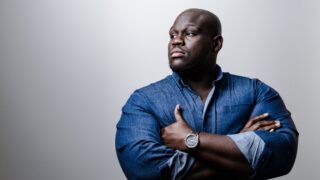The Lavin Agency Speakers Bureau
A speakers bureau that represents the best original thinkers,
writers, and doers for speaking engagements.
A speakers bureau that represents the best original thinkers,
writers, and doers for speaking engagements.
Our justice system has far-reaching repercussions for our democracy—understanding it will equip us with the tools to rebuild trust in our institutions.
This is a crucial moment in our democracy: our courts and politics are divided, and the binding trust that we place in our institutions is fast eroding. But historian Mary Ziegler says that we can move beyond polarization—we can achieve a better dialogue and fairer future for all. Widely hailed as a nonpartisan authority on the Constitution and the legal history of reproductive rights, Mary is a professor at UC Davis School of Law, the author of five acclaimed books, and a frequent contributor to the New York Times and The Atlantic. “There’s a lot of demonization of people we don’t agree with that stems from a lack of empathy,” Mary says. “This isn’t a women’s issue, it’s a democracy issue.”
“One of our very best—and nonpartisan!—historians of post-1970 America.”— David J. Garrow, Pulitzer Prize-winning author of Bearing the Cross
Mary Ziegler is a leading authority on reproductive and constitutional rights within the American justice system. As a lawyer, she understands how our courts affect every facet of our lives; as a historian, she investigates how we got to this level of political division and polarization—and how we can still get ourselves out. Mary reveals that the abortion debate and the political landscape after Roe v. Wade is a symptom of larger shifts in our democracy: “abortion can be the canary in the coal mine when it comes to other changes in the US political system.”
In her latest book, Personhood: The New Civil War over Reproduction, Mary argues that simply undoing Roe v. Wade has never been the endpoint for the antiabortion movement. Rather, the larger goal has been to secure recognition of fetuses and embryos as persons. She chronicles the internal struggles and changing ideas about race, sex, religion, war, corporate rights, and poverty that shaped the personhood struggle over half a century, and suggests that other ways of valuing both fetal life and women’s equality might be possible. David J. Garrow, Pulitzer Prize–winning author of Bearing the Cross, calls Mary’s treatment of the subject “fair-minded and sincerely empathetic,” pointing to it as “a hallmark of her scrupulous scholarship.”
In her book Roe: The History of a National Obsession, Mary reveals how Roe v. Wade has repercussions far beyond the abortion debate and the medical field. She shows how Roe helps explain broader aspects of America today: from racial justice to our constitutional rights, and from our democratic institutions to the role of science in politics. She helps us make sense of our current political climate—Publishers Weekly called her book “a must-read for those seeking to understand what comes next.”
Her previous book Dollars for Life traces how the battle to reverse Roe v. Wade changed the rules around our economy, our elections, and our democracy at large. Her previous three books offer a compelling view of American abortion law and politics, and how they connect to our trust in the justice system. She’s currently a professor at the University of California, Davis School of Law, and has provided critical commentary and expertise to news outlets including CNN, NPR, Bloomberg TV, The Washington Post, and The New York Times. She is also a 2023 Guggenheim Fellow, chosen “on the basis of prior achievement and exceptional promise.”

One of America's Foremost Experts on the Declaration of Independence Award-Winning Author, Disunion Among Ourselves

Author, We Refuse to Forget and BLACK MOSES Contributing Writer, The New York Times Magazine Associate Professor, Northeastern University
New Yorker Writer Author of Antisocial

#1 New York Times Bestselling Author of Grit and Situated | Pioneering Researcher on Grit, Perseverance, and the Science of Success

Nobel Prize Winner | 3rd Most Cited Economist in the World | Bestselling Co-Author of Why Nations Fail and Power and Progress

Harvard Business School Behavioral Science Professor | "40 Under 40 MBA Professor" | Author of TALK: The Science of Conversation and the Art of Being Ourselves

#1 New York Times Bestselling Co-Author of Abundance | Host of thePlain English Podcast | CBS News Contributor

#1 New York Times Bestselling Author of How the Word Is Passed and Above Ground | The Atlantic Staff Writer

For two hundred and fifty years, women have been central to America’s constitutional experiment. Their contributions have far-reaching implications for the story of our past—and of our future.
In this talk, constitutional scholar Mary Ziegler traces women’s contributions to our Constitution from 1776 to the present. It’s a story of rights gained and lost—and about how women mobilized to make sure the rights they gained applied to everyone, and delivered more than an empty promise. From women’s struggle for personhood in marriage and suffrage to the fights over sexual violence, equal pay, civil rights, and the loss of the right to abortion, Mary shows how women have been central to America’s constitutional story, and she reminds us what these women never forgot: that securing constitutional rights is only the first step to the equality that all women deserve.

The reversal of Roe v. Wade, the landmark Supreme Court decision to protect the right to choose abortion, is about much more than reproductive rights. At its heart, it’s about the rise of a conservative legal movement, the transformation of Supreme Court nominations, the fundamental changes in the U.S. Republican Party, and the rise of extreme polarization. What does this decision mean for our democracy or the Court’s legitimacy?
As a preeminent expert on the legal and political history of our constitutional rights, lawyer and historian Mary Ziegler is uniquely situated to answer these questions and guide us through this turbulent topic. Understanding what happened to Roe v. Wade shines a light on broader issues of partisanship and the erosion of democratic norms in the United States—but it’s not too late to regain control of our democracy and restore our trust in the justice system.

Polls show that American voters are mostly in agreement about abortion, but legal and political debates continue to rage from the right to the left—and that’s just one of the many current issues that divide us. How did we get to this point, and how can we recover?
Legal historian Mary Ziegler points to the fact that we haven’t always been this divided, which means that we can still take responsibility for our conflicts and work together for a better future. With insights from her prominent legal history research, she investigates the causes and effects of our deepening political rifts. She guides us to an understanding of where our current debates come from, and how we can rebuild a kinder and more nuanced dialogue around the law, the justice system, and our fundamental rights.